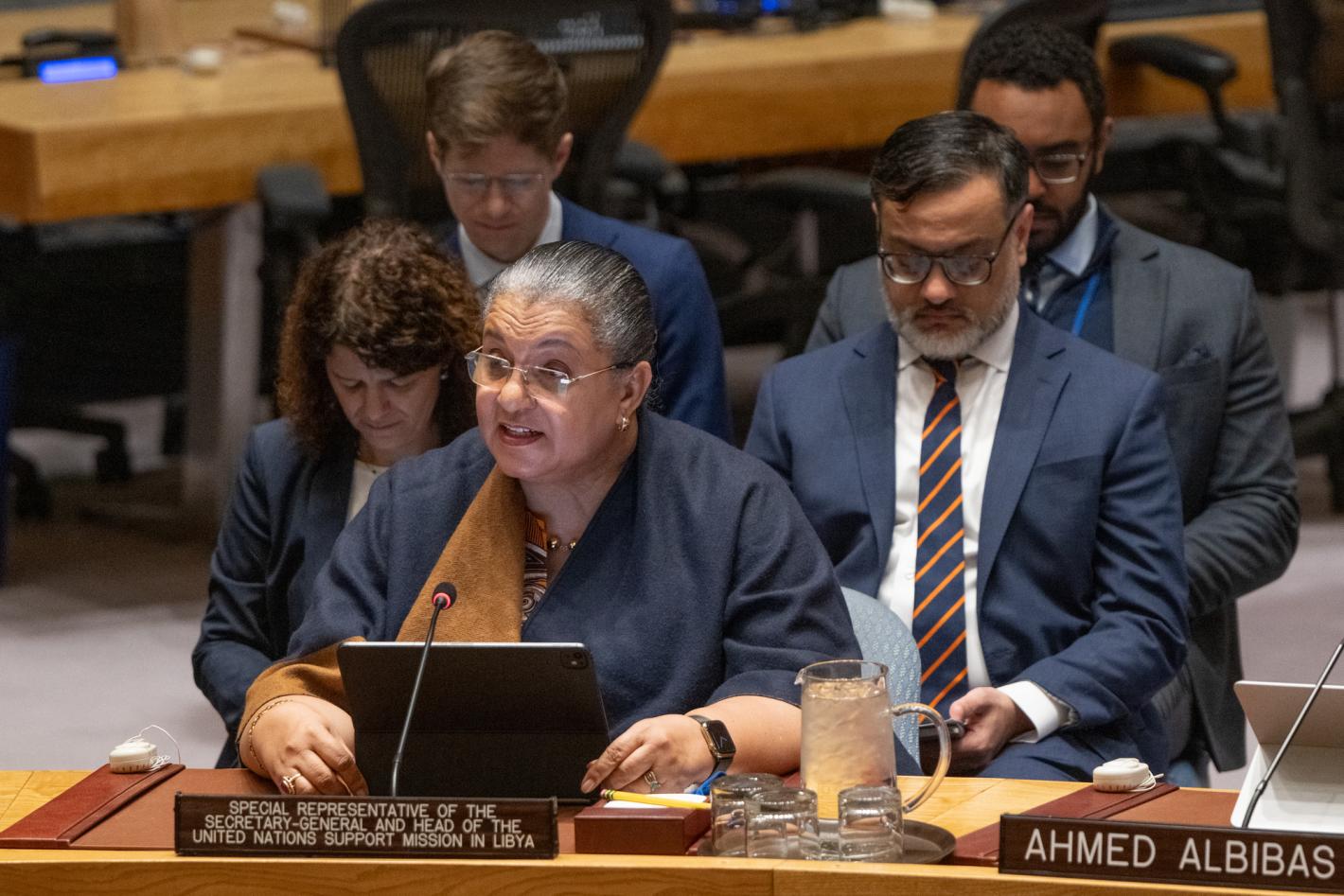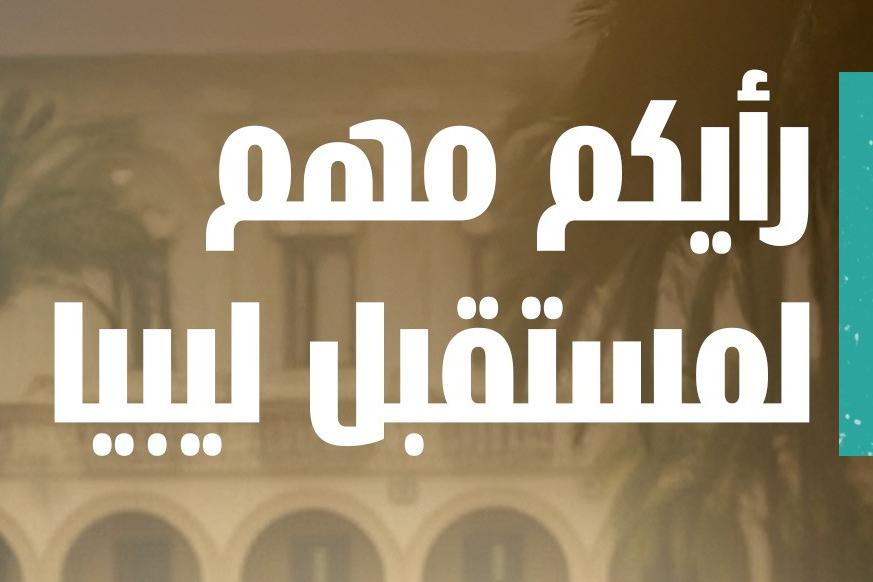السيد الرئيس،
شكراً على إتاحة الفرصة لي لإحاطة مجلس الأمن بشأن المستجدات الأخيرة في ليبيا.
على الصعيد السياسي، يسعدني أن أبلغكم بأنه ومنذ الإحاطة الأخيرة لمجلس الأمن في 20 حزيران/يونيو، شهد المسار الدستوري شيئاً من التقدم.
حيث عقدت في القاهرة بين 12 و20 حزيران/يونيو الجولة الثالثة والأخيرة من المشاورات بين مجلس النواب والمجلس الأعلى للدولة حول القاعدة الدستورية المنظمة للانتخابات.
وتوصل الوفدان إلى توافق كبير حول غالبية المواد الأشد إثارة للخلاف من مقترح الدستور 2017. ولكن بقيت الاختلافات حول التدابير المنظمة للمرحل الانتقالية التي ستفضي إلى الانتخابات.
ومع ذلك، فإن التقدم الذي أحرز جدير بالثناء، إذ أن الاجتماع يعدُ المرة الأولى التي يعكف فيها كل من مجلسي النواب والدولة على المراجعة الجدية لمقترح الدستور منذ اعتماده في 2017.
واستبشرنا خيراً حين قبلت رئاستا المجلسين دعوة المستشارة الخاصة ستيفاني وليامز للاجتماع في جنيف في 28 و29 حزيران/يونيو للتباحث والتوصل لتوافق حول التدابير المنظمة للمرحلة الانتقالية التي ستفضي إلى الانتخابات.
السيد الرئيس،
نحن مقتنعون قناعة راسخة بأن الانتخابات هي السبيل الوحيد لتسوية الخلافات حول الشرعية الديمقراطية لجميع المؤسسات الليبية.
وهنا أستذكر بأن مجلس النواب انتخب في 2014 لدورة واحدة مدتها أربعة أعوام، بينما المجلس الأعلى للدولة، الجسم القديم المنبثق عن المؤتمر الوطني العام، انتخب قبل ما يقارب العشر سنوات في 2012.
وأناشد المجلس الموقر وجميع شركاء ليبيا الدوليين لحث رئاستي هاتين الغرفتين لاغتنام الفرصة التي يمنحها التوافق الذي حصل في القاهرة. فالفرصة سانحة الآن للاتفاق على النقاط العالقة وإجراء الانتخابات.
السيد الرئيس،
لا نزال ملتزمون بدعم الجهود الليبية تجاه المصالحة الوطنية، والعمل عن قرب مع شركائنا، بما في ذلك الاتحاد الأفريقي.
وبهذا الخصوص، نرحب بإطلاق المجلس الرئاسي الرؤية الاستراتيجية لمشروع المصالحة الوطنية في 23 حزيران/يونيو.
وفي حين نثمن تركيز هذه الوثيقة على معالجة الأسباب الجذرية للنزاع، إلا أننا نؤكد في الوقت نفسه على ضرورة أن تكون عملية المصالحة شاملة للجميع ومركِّزة على الضحايا وقائمة على الحقوق ومترسّخة في مبادئ العدالة الانتقالية مع التركيز على الحقيقة والمساءلة وجبر الضرر.
السيد الرئيس،
يسهم استمرار الانقسامات السياسية في خلق مناخ أمني مشحون في طرابلس وما حولها. فالإشكالية التي طالت السلطة التنفيذية لم تحل بعد.
ومع استمرار التشكيلات المسلحة في التمترس إما تأييداً للسيد الدبيبة أو للسيد باشاغا تزيد احتمالات التصعيد.
وأؤكد على أن الأمم المتحدة تقف على أهبة الاستعداد لتيسير الحوار بين السيد الدبيبة والسيد باشاغا.
وأناشد جميع الأطراف الليبية السياسية والأمنية على التحلي بأقصى درجات ضبط النفس وحل جميع الخلافات عبر الحوار.
وأحيي أيضا استئناف اللجنة العسكرية المشتركة (5+5) ورئيسي الأركان أعمالهم مؤخراً وأشيد بضم أصواتهم المناشدة بالحفاظ على الهدوء والاستقرار في البلاد.
ففي 7 حزيران/يونيو في العاصمة التونسية، ترأست المستشارة الخاصة وليامز إلى جانب فرنسا الجلسة العامة لمجموعة العمل الأمنية المنبثقة عن عملية برلين بمشاركة اللجنة العسكرية المشتركة (5+5).
وركزت المناقشات على ضرورة تعزيز وقف إطلاق النار بما في ذلك عبر ضمان التقدم المحرز في مجال نزع السلاح والتسريح وإعادة إدماج التشكيلات المسلحة والميليشيات وانسحاب المرتزقة والمقاتلين الأجانب والقوات الأجنبية من ليبيا.
وشكل الاجتماع أيضاً فرصة ثمينة للمراقبين الليبيين لوقف إطلاق النار من المنطقة الشرقية والغربية لخوض أولى مناقشاتهم بشأن تفعيل آلية مراقبة وقف إطلاق النار التي يقودها الليبيون ويملكون زمامها. وبتيسير من البعثة، تعتزم اللجنة العسكرية المشتركة والمراقبين المحليين الاجتماع مرة أخرى في تونس في 28-29 حزيران/يونيو.
وفي غضون ذلك، لا يزال مراقبو وقف إطلاق النار التابعين للبعثة في طرابلس لحين منح السلطات المعنية موافقتها على الأماكن المخصصة لسكناهم وعملهم بالإضافة إلى تهيئة الظروف اللازمة لتمكين المراقبين من العمل في سرت.
السيد الرئيس،
وعلى الصعيد الاقتصادي، يستمر الإغلاق الجزئي لقطاع النفط الليبي، فمنذ 16 نيسان/أبريل، أدى الإغلاق إلى خفض صادرات النفط الليبية بمقدار الثلث وكلف البلاد خسائر في الإيرادات تقدر بـ 3.1 مليار دولار أمريكي.
بالإضافة إلى ذلك، يستمر الخلاف حول السيطرة على الأموال العامة واستخدامها والذي أدى إلى الإغلاق الجزئي ويمكن أن يؤدي إلى مزيد من إغلاق حقول النفط على المدى القريب.
ويمكن أن يؤثر تعليق تحويلات عائدات النفط تأثيراً سلبيا على قدرة حكومة الوحدة الوطنية على دفع المرتبات وتلبية احتياجات الإنفاق الأخرى، بما في ذلك الخدمات الاجتماعية الأساسية.
وفي تطور إيجابي، يسرني أن أبلغكم بأن الأمم المتحدة ووزارة التخطيط وقعتا في 7 حزيران/يونيو أول إطار للتعاون في مجال التنمية المستدامة، يشمل الفترة من 2023 إلى 2025.
ويعمل الإطار على توجيه أعمال بناء السلام والتنمية التي تضطلع بها هيئات الأمم المتحدة في ليبيا، بما يتماشى مع الأولويات الوطنية ويعزز تحقيق أهداف التنمية المستدامة.
السيد الرئيس،
لا تزال حالة حقوق الإنسان في ليبيا مبعثاً للقلق.
حيث لا يزال تسعة من العاملين في المجتمع المدني والعاملين في المجال الإنساني الذين اعتقلوا بين تشرين الثاني/نوفمبر 2021 وشباط/فبراير 2022 يقبعون في الاحتجاز بسبب ممارستهم السلمية لحقهم في حرية التعبير.
وفي 8 حزيران/يونيو، لم يسمح لأربعة من هؤلاء الأشخاص المحتجزين تعسفيا بحضور جلسة مقررة أمام المحكمة، بل وكانت مجريات الجلسة أبعد ما تكون عن معايير المحاكمة العادلة.
ولا زال يساورني القلق لأن الفضاء المدني في تدهور مستمر. ولا تزال القيود التعسفية تفرض على منظمات المجتمع المدني، إذ يستهدف النساء والرجال من النشطاء السياسيين والمدافعين عن حقوق الإنسان بخطاب الكراهية والتحريض على العنف، مما يعرض سلامتهم وأمنهم للخطر.
منذ أيار/مايو، تلقت بعثة الأمم المتحدة للدعم في ليبيا تقارير أخرى عن مزاعم خطيرة بالتعذيب ضد الليبيين والمهاجرين وطالبي اللجوء في مراكز الاحتجاز والسجون.
ينبغي على السلطات الليبية التحقيق في جميع مزاعم التعذيب وغيره من انتهاكات حقوق الإنسان في مراكز الاحتجاز، بما في ذلك تلك المرافق الخاضعة لسيطرة إدارة مكافحة الهجرة غير الشرعية التابعة لوزارة الداخلية.
ويجب محاسبة المسؤولين عن الانتهاكات الجسيمة لحقوق الإنسان، بما في ذلك الجرائم الفظيعة، محليا أو، حسب الاقتضاء، من قبل آليات العدالة الدولية، على غرار المحكمة الجنائية الدولية.
ومن المؤسف أنه بالنسبة للعديد من الضحايا والناجين، فإن العدالة والمساءلة - بما في ذلك سبل الانتصاف والجبر- مستعصية أو شديدة البطء.
فعلى سبيل المثال، أحالت محكمة استئناف طرابلس في 14 حزيران/يونيو قضية مذبحة أبوسليم عام 1996 إلى نظام القضاء العسكري، مؤكدة أنها تفتقر إلى الاختصاص اللازم للنظر في القضية.
يشير هذا الحكم الأخير، إلى جانب الوقت المنقضي، إلى أن نظام العدالة الجنائية الليبي غير قادر أو غير راغب في محاكمة الأفراد على الجرائم الفظيعة.
وتحقيقا لهذه الغاية، فإن تمديد ولاية البعثة المستقلة لتقصي الحقائق بشأن ليبيا أمر ضروري للتحقيق في انتهاكات القانون الدولي الإنساني وقانون حقوق الإنسان والإبلاغ عنها.
وسيسهم دور بعثة تقصي الحقائق في النهوض بحقوق الإنسان، والمساهمة في تأمين السلام المستدام، وتعزيز المصالحة الوطنية القائمة على الحقوق في ليبيا.
السيد الرئيس،
حتى 14 حزيران/يونيو، سجلت الأمم المتحدة عودة 10.000 آخرين من المشردين داخلياً إلى ديارهم الأصلية منذ بداية العام. ويبلغ العدد الإجمالي المشردين داخلياً الآن 159.000 شخص.
بيد أن التهديدات بالإخلاء القسري للمشردين داخليا لا تزال تثير القلق. وفي طرابلس، في 15 حزيران/يونيو، تعرضت حوالي 90 أسرة نازحة للتهديد من قبل أفراد التشكيلات المسلحة بالجرافات. وصدرت ضدهم أوامر بإخلاء المباني التي يقيمون فيها في غضون عشرة أيام. ويأتي هذا التحذير في أعقاب عمليات إخلاء قسري لثلاثة مخيمات تستضيف عائلات نازحة من تاورغاء في أيار/مايو.
وهناك حاجة إلى بذل المزيد من الجهود من جانب الحكومة، بدعم من شركاء الأمم المتحدة، لإيجاد حلول دائمة لأولئك الذين ما زالوا مشردين داخليا، بما يتماشى مع المعايير الدولية.
السيد الرئيس،
في الختام، اسمحوا لي أن أشدد على أن ليبيا أحرزت تقدما كبيرا في السنوات القليلة الماضية نحو مجتمع أكثر شمولا للجميع. ومن أجل الشعب الليبي، ينبغي ألا نسمح لهذا التقدم بأن يتبدد.
ولا تزال أولوية الأمم المتحدة في ليبيا تتمثل في تسهيل العودة إلى العملية الانتخابية، استناداً إلى قاعدة دستورية سليمة وتوافقية للانتخابات. إنه مطلب الشعب الليبي.
إن نتيجة محادثات القاهرة خطوة في الاتجاه الصحيح.
ويحدوني الأمل في أن يسفر الاجتماع المقبل في جنيف بين رئيسي مجلس النواب والمجلس الأعلى للدولة عن اتفاق نهائي يفضي إلى إجراء انتخابات في أقرب وقت ممكن.
واسمحوا لي أن أشدد على أن دعم المجلس المستمر والموحد لهذه الجهود أمر أساسي.
شكراً لكم.





